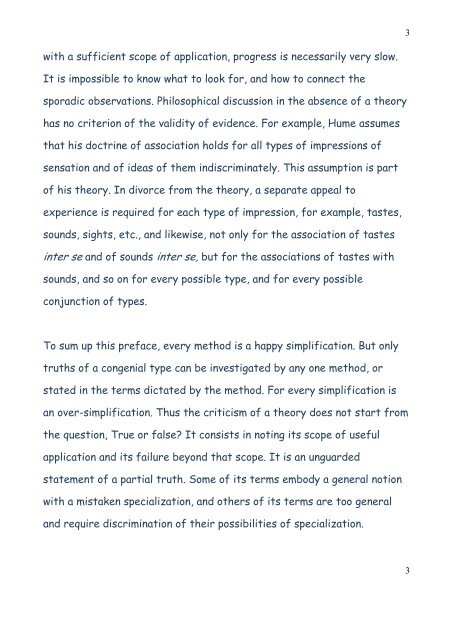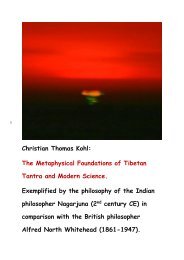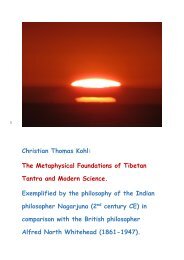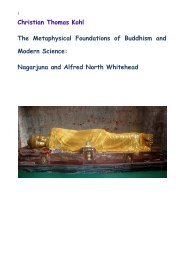The Metaphysical Foundation of Buddhism and Modern Science
The Metaphysical Foundations of Buddhism and Modern Science: Nagarjuna and Alfred North Whitehead
The Metaphysical Foundations of Buddhism and Modern Science: Nagarjuna and Alfred North Whitehead
You also want an ePaper? Increase the reach of your titles
YUMPU automatically turns print PDFs into web optimized ePapers that Google loves.
3<br />
with a sufficient scope <strong>of</strong> application, progress is necessarily very slow.<br />
It is impossible to know what to look for, <strong>and</strong> how to connect the<br />
sporadic observations. Philosophical discussion in the absence <strong>of</strong> a theory<br />
has no criterion <strong>of</strong> the validity <strong>of</strong> evidence. For example, Hume assumes<br />
that his doctrine <strong>of</strong> association holds for all types <strong>of</strong> impressions <strong>of</strong><br />
sensation <strong>and</strong> <strong>of</strong> ideas <strong>of</strong> them indiscriminately. This assumption is part<br />
<strong>of</strong> his theory. In divorce from the theory, a separate appeal to<br />
experience is required for each type <strong>of</strong> impression, for example, tastes,<br />
sounds, sights, etc., <strong>and</strong> likewise, not only for the association <strong>of</strong> tastes<br />
inter se <strong>and</strong> <strong>of</strong> sounds inter se, but for the associations <strong>of</strong> tastes with<br />
sounds, <strong>and</strong> so on for every possible type, <strong>and</strong> for every possible<br />
conjunction <strong>of</strong> types.<br />
To sum up this preface, every method is a happy simplification. But only<br />
truths <strong>of</strong> a congenial type can be investigated by any one method, or<br />
stated in the terms dictated by the method. For every simplification is<br />
an over-simplification. Thus the criticism <strong>of</strong> a theory does not start from<br />
the question, True or false? It consists in noting its scope <strong>of</strong> useful<br />
application <strong>and</strong> its failure beyond that scope. It is an unguarded<br />
statement <strong>of</strong> a partial truth. Some <strong>of</strong> its terms embody a general notion<br />
with a mistaken specialization, <strong>and</strong> others <strong>of</strong> its terms are too general<br />
<strong>and</strong> require discrimination <strong>of</strong> their possibilities <strong>of</strong> specialization.<br />
3


















